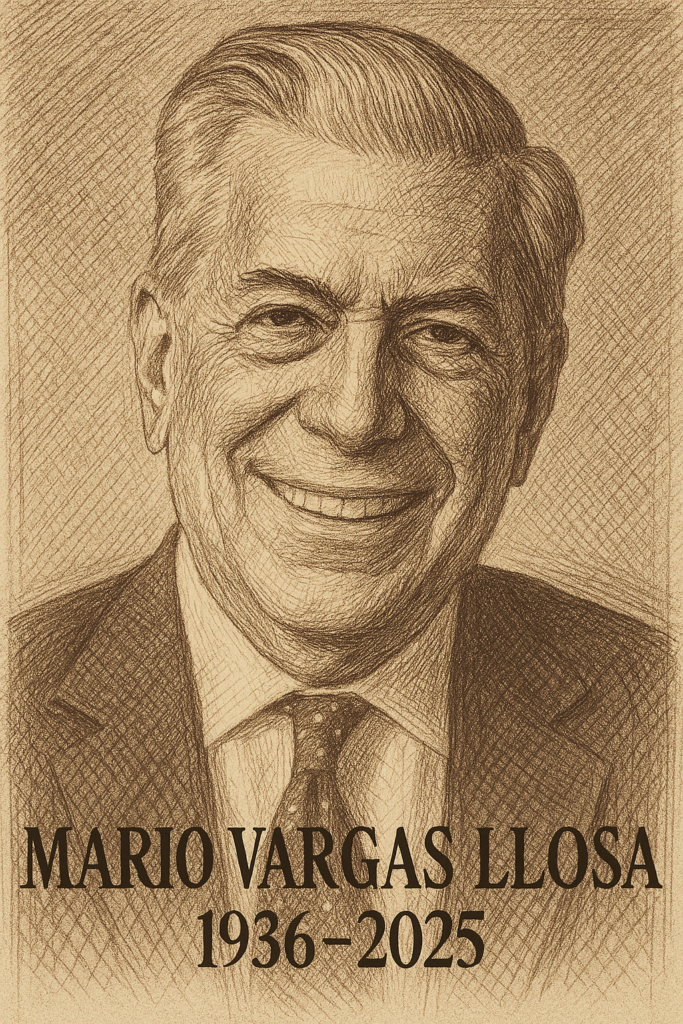
Prompt and concept by Mario Garcia
I learned of Vargas Llosa’s death while preparing a presentation on The Scent of the Human—my term for the qualities that distinguish human creativity from machine output. Vargas Llosa, who died in Peru April 13, at age 89, embodies this idea fully. His work is not merely crafted; it is lived, debated, and wrestled into being.
The Scent of the Human refers to intentionality and subjectivity, emotional nuance and a personal worldview. A writer leaves his scent when his writing is shaped by life experience, culture, memory, intuition, and, in the case of Vargas Llosa, history and politics. He even ran for president of Peru in 1990, advocating changes for a Peru that he considered to be governed by years of corrupt leaders, while advocating for the strengthening of society based on free trade.
As El País wrote:
“For him, writing and politics were always two sides of the same coin: that of individual freedom.”
The Political as Personal: Conversation in the Cathedral
His 1969 novel Conversation in the Cathedral is often considered his masterpiece. It begins with the now-iconic question:
“At what precise moment had Peru fucked itself up?”
This novel marks his break with romanticized leftist ideologies, including Fidel Castro’s Cuba, and signals his growing disillusionment with authoritarianism of all kinds.
Literary Awakening and the Latin American Boom
I first read Vargas Llosa as an undergraduate at the University of South Florida during the crest of the Latin American Boom in the 1960s—with Vargas Llosa alongside García Márquez, Julio Cortázar, Carlos Fuentes, and Guillermo Cabrera Infante. My interest deepened later during graduate studies in Spanish and comparative literature at the University of Miami during the 1970s, where I explored his ties to naturalism and his admiration for Gustave Flaubert. Literary naturalism was the subject of my doctoral dissertation (1976).
Flaubert’s Heir: Naturalism in a Peruvian Key
Flaubert’s Madame Bovary, often considered a proto-naturalist novel, helped shape Vargas Llosa’s realist lens, particularly in his debut novel La ciudad y los perros (The Time of the Hero, 1963), set in a military academy in Lima. The novel explores determinism, social decay, and institutional violence—motifs common to Emile Zola and Flaubert, reimagined in a Latin American setting. Like Zola or Flaubert, Vargas Llosa does not shy away from depicting brutality, decay, and the darker sides of human nature.
Blending Fiction and Life: Aunt Julia and the Scriptwriter
In La tía Julia y el escribidor (Aunt Julia and the Scriptwriter, 1977), Vargas Llosa fictionalizes autobiography in a manner that recalls the New Journalism. Just as Truman Capote and Tom Wolfe brought literary techniques into nonfiction, Vargas Llosa inverted the process—bringing autobiographical material into the realm of fiction with humor, elegance, and inventiveness.
Just as Capote (In Cold Blood, 1966) and Wolfe (The Electric Kool-Aid Acid Test, 1968) recast factual narratives with the tools of fiction—scene-building, dialogue, character development—Vargas Llosa in Aunt Julia and the Scriptwriter does something equally radical but in reverse: he fictionalizes autobiography.
It is somewhat difficult to place Vargas Llosa within the confines of specific literary movements. He touched upon magical realism, but is not considered one of the magical realists. There are naturalistic motifs in all of his work, but he is not a naturalist. And, did he adhere to the techniques of the New Journalism? Overall, Vargas Llosa defied easy classification.
A Towering Career Across Genres and Continents
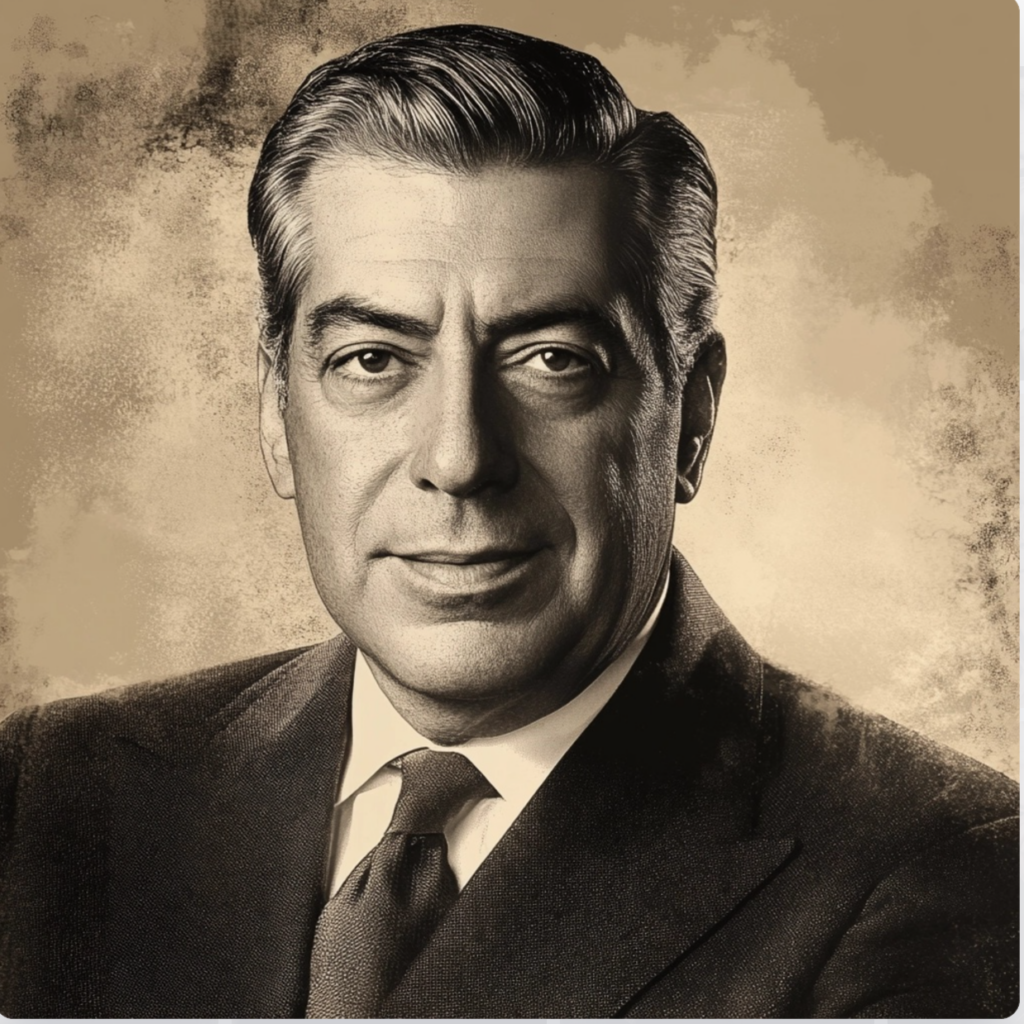
Vargas Llosa published 21 novels and countless essays, plays, and memoirs. From 1990 to December 2023, he wrote a regular column for El País, offering sharp political and cultural commentary in the Piedra de Toque (Touchstone) section. His work was syndicated widely, and his intellectual influence extended well beyond literature.
Spain granted him citizenship, and for decades he was regarded as one of its foremost public intellectuals. In its tributes to Vargas Llosa, El País referred to him simply as “a giant of world literature.”
A Voice That Shaped a Language
Several of the tributes published in El Pais cite the richness of Vargas Llosa’s Spanish prose. As columnist Javier Cercas wrote :
“”It is very difficult right now to grasp the magnitude of this man who has just died in Lima at the age of 89. In fact, the simplest—and perhaps the most accurate—way to do so is through a basic reminder:At 26, Vargas Llosa published The Time of the Hero; at 30, The Green House; at 33, Conversation in the Cathedral. Had he died before 35, after publishing those three masterpieces, he would still be counted among the greatest writers in our language.”
Pride in Language, Precision in Prose
The scent of the writer. The scent of the chef. What the human brings to the plate—or to the page.
El País captured the essence of Mario Vargas Llosa here:
“He drank from all sources and took part in every debate.”
Mario Vargas Llosa’s literary scent—the unmistakable aroma of conviction, memory, and mastery—is likely to linger forever.
Our workshop deals with the two big revolutions facing editors
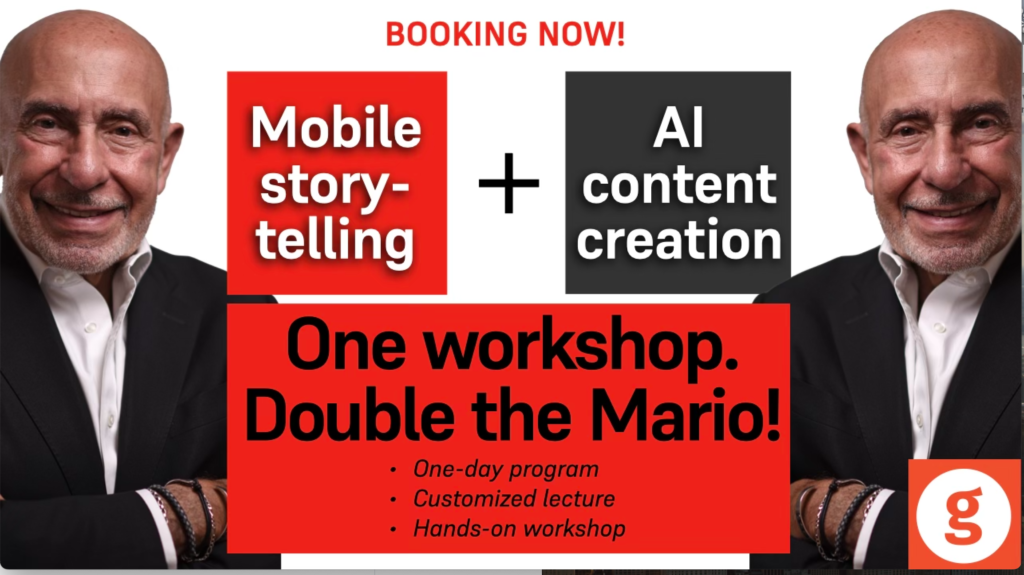
For me, it is imperative that editors approach content creation thinking in terms of mobile first.
Mobile first involves the type of transformation where all content is prepared thinking from small to large platform. Thinking small platform does not mean that the reporter conceptualizing a story for mobile consumption should not think BIG. So, plan from small to large, but think big in terms of the story content and the visual assets that go with it.
While mobile first is still elusive to so many newsrooms around the planet, here we are, in 2024, faced with an even bigger challenge not just knocking at our doors, but already IN: Artificial Intelligence.
Transformation and a change of mentality to face these challenges is the first step. Training and education to tackle them with a sense of focus and direction is essential.
That’s where our Garcia Media workshops come in
Our Garcia Media Mobile Storytelling workshops introduce your editorial team to the way we write, edit and design for mobile platforms. This one-day program includes a presentation and a hands-on workshop. We’ve added a new segment about AI for content creation.
Newsrooms around the planet have gone mobile-first after a Garcia Media workshop!
Our Garcia Media Mobile Storytelling workshops are proven to introduce your editorial team to the way we write, edit and design for mobile platforms. It is a one-day program that involves a presentation (where I summarize my Columbia University class content), and follow it with a hands on workshop.
For details, to customize, and to book: mario@garciamedia.com
Media predictions for 2024
Every year, Harvard University’s Nieman Lab publishes what selected media people predict for journalism in the following years. You can find my own prediction here;
https://www.niemanlab.org/2023/12/ai-takes-center-stage/
Start writing or type / to choose a block
How we use AI
Honored to be mentioned here:
https://www.newsroomrobots.com/p/how-10-news-industry-leaders-use
Order my AI book here:
https://thaneandprose.com/…/preorder-ai-what-to-expect…
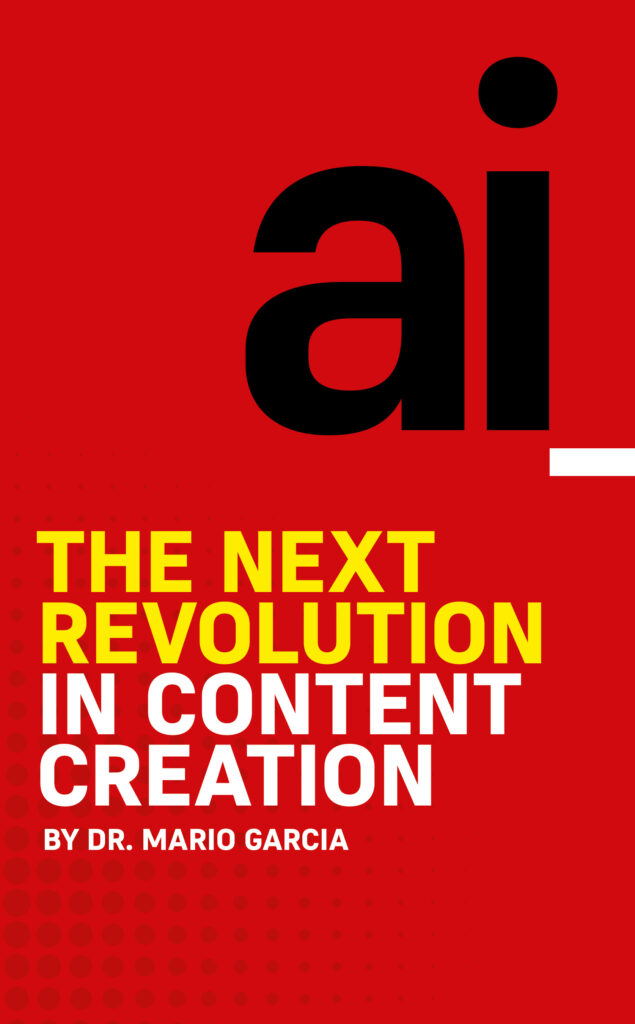
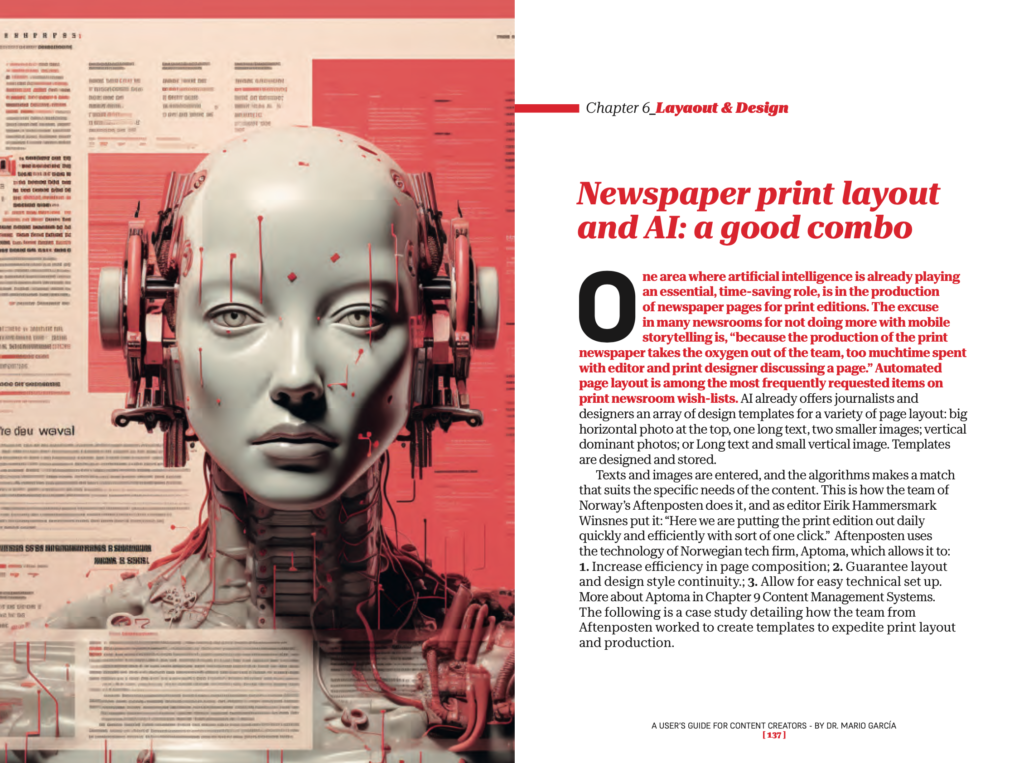
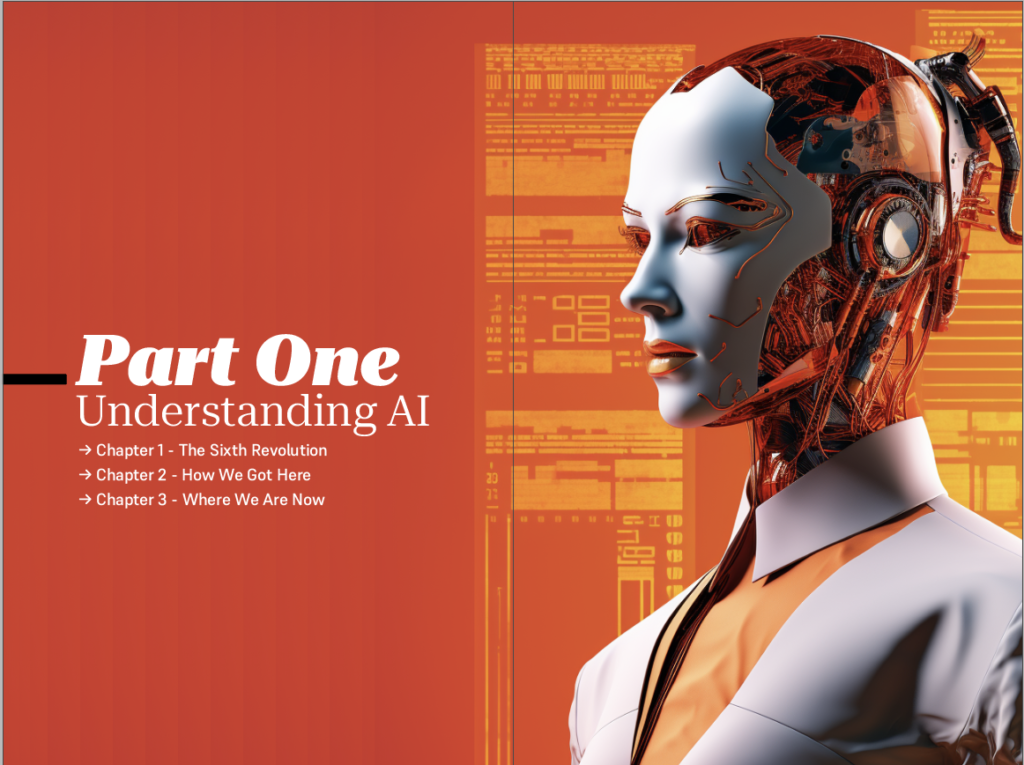
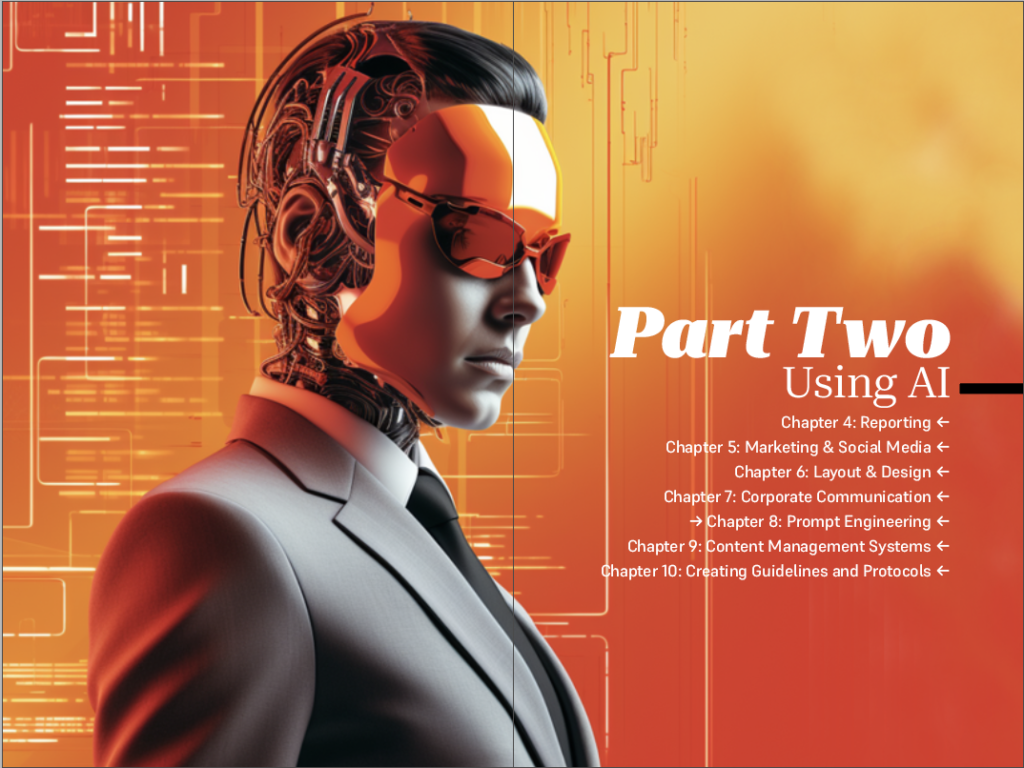
Here is a chance to pre-order my new book about Artificial Intelligence and content creation. The first 25 copies sold will be signed! Order here:
https://thaneandprose.com/…/preorder-ai-what-to-expect…
Reviews for AI book:
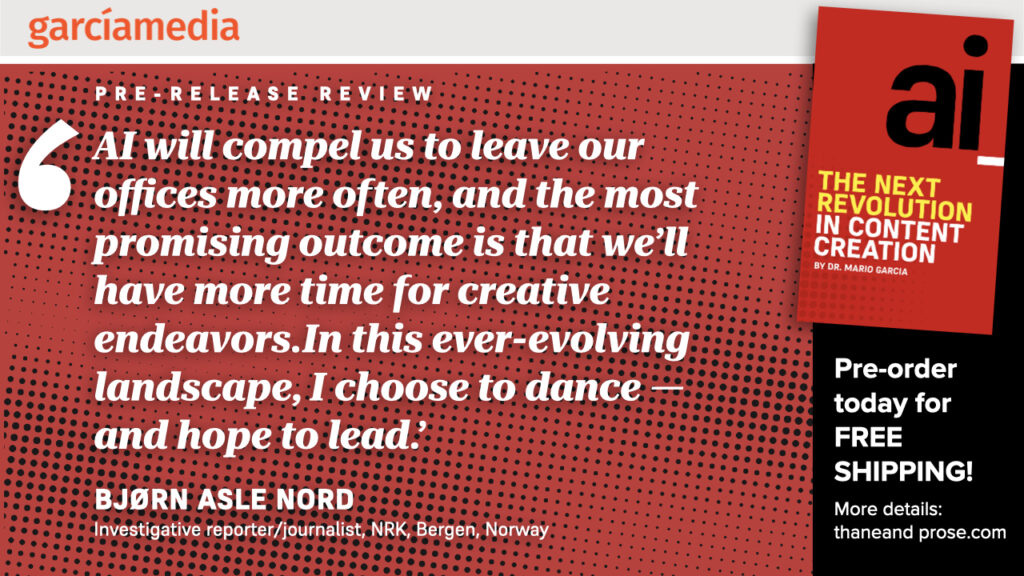
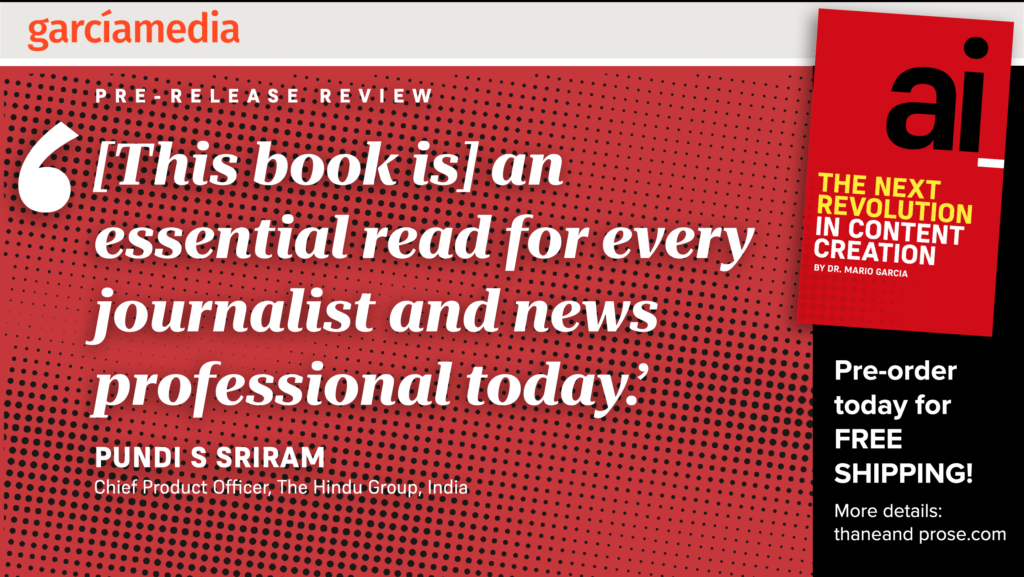
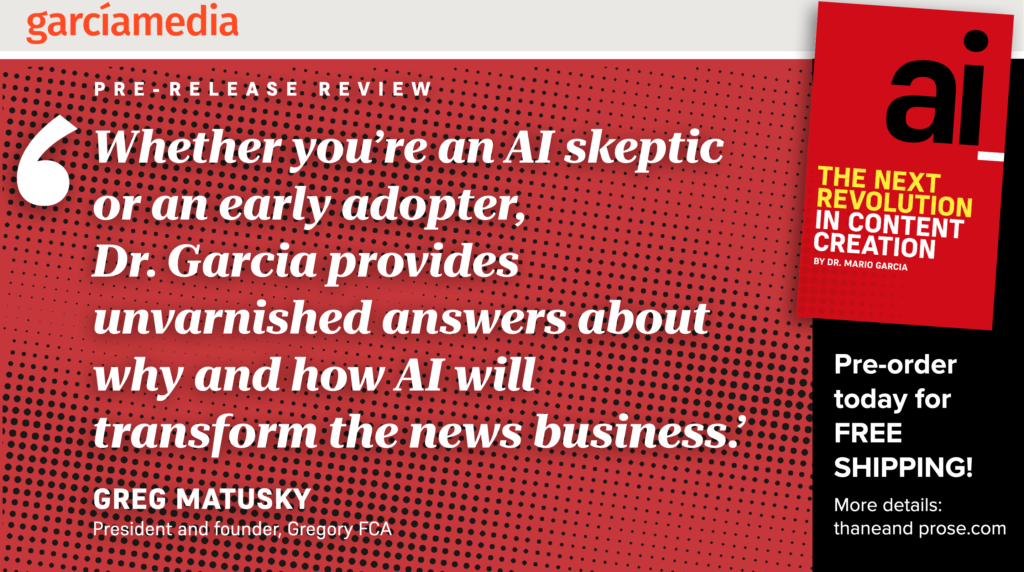
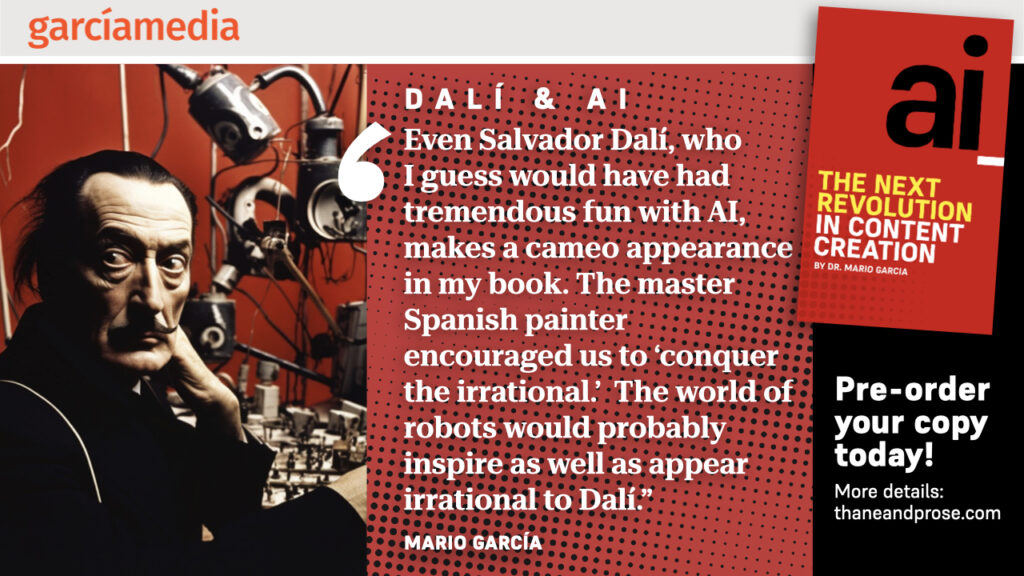
Did you read The Story yet?
I urge you to consult my latest book, The Story, a trilogy full of tips and explanations about mobile storytelling, which represents the latest genre for journalists to explore. See information below:
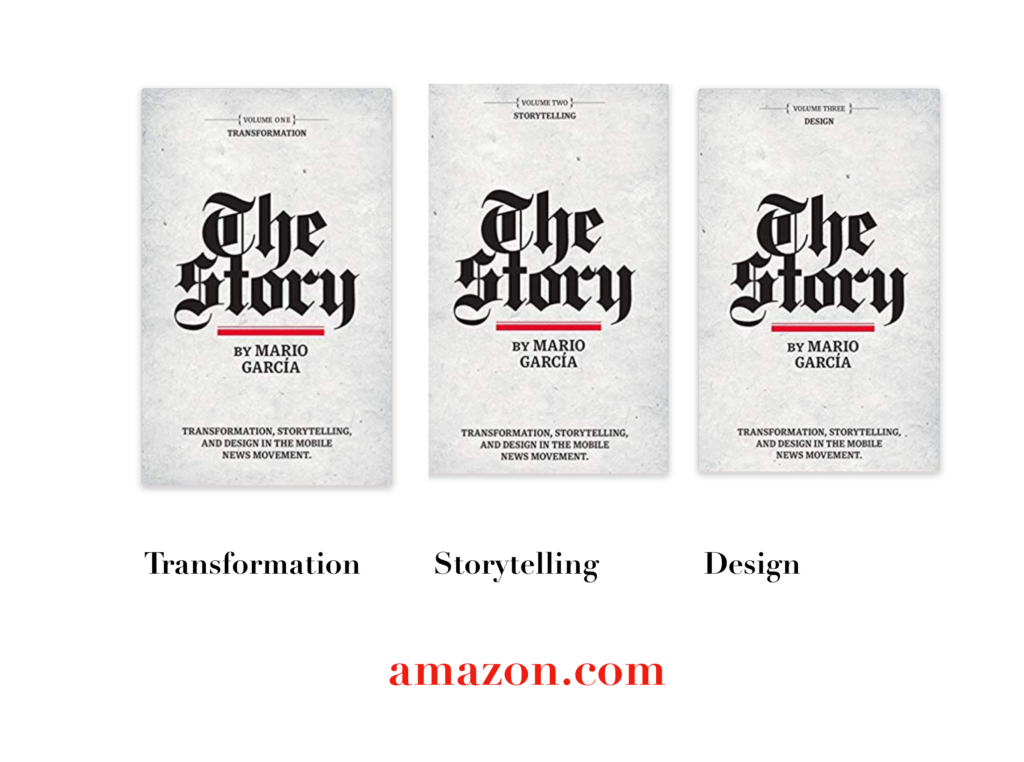
The full trilogy of The Story now available–3 books to guide you through a mobile first strategy. Whether you’re a reporter, editor, designer, publisher, corporate communicator, The Story is for you! https://amazon
Volume 1: Transformation
https://books.apple.com/us/book/the-story-volume-i/id1480169411
Volume Two: Storytelling
https://books.apple.com/us/book/the-story-volume-ii/id1484581220
Volume Three: Design
https://books.apple.com/us/book/the-story-volume-iii/id1497049918
Order the print edition of The Story, from Amazon, here:
TheMarioBlog post #4005